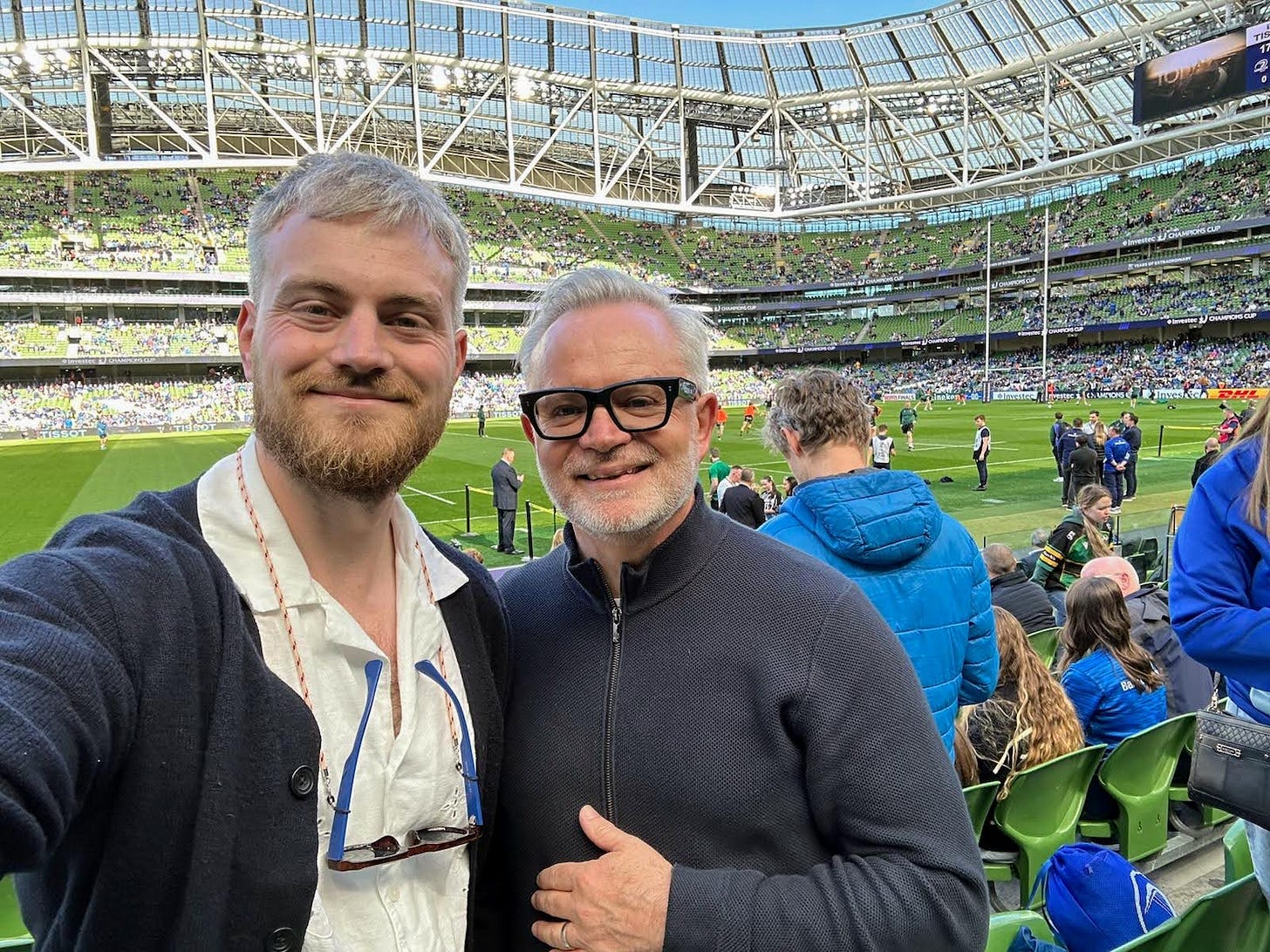We can't [...] until [...]
Two weeks of rewrites. Some stories hold us together. Others hold us back.
Ten days ago, I was in Dublin.
At the Aviva Stadium, shoulder to shoulder with tens of thousands of Leinster fans and my dad, we watched (our) Northampton Saints walk into what was widely considered an impossible task. The pundits were unanimous: Saints didn’t stand a chance. We didn’t disagree.
Chris Ashton predicted Leinster would blow them away. Brian O’Driscoll said Saints had “no obvious edge.” Most predicted a 30-point defeat and, to be honest, so long as Northampton managed to fire a few shots and we had a nice meal out after the game, Dad and I would have returned home happy.
In my 30 years following Northampton, I don’t think I’ve attended a knockout game where the narrative was so emphatically clear: this was a step too far for our boys. But Saints weren’t interested in that story. What followed was an extraordinary act of collective defiance and bold action, with some good fortune thrown in to boot. They refused to accept the script they’d been handed and rewrote another one instead. Cue disbelief. Cue jubilation. Cue Guinness.
Last week, I was in South West England and South East Wales.
Devon and Cardiff.
I spent the week with sixteen school leaders from Pembrokeshire visiting schools that are taking bold action to rewrite the scripts in the communities they serve. We spent the mornings visiting schools and the afternoons and evenings reflecting on what it takes to lead that kind of change—what it costs, what it reveals, and what it makes possible when you refuse to accept the stories that others have written for your school, your staff, or your children.
During one of these afternoon sessions, we invited our leaders to complete a deceptively simple exercise: name a challenge your school faces using the structure, “We can’t […] until […].”
We can’t provide the support our children need until the funding system recognises the scale and depth of their needs.
We can’t redesign our provision until we have more control over how our budget is allocated.
We can’t prioritise what matters most until the accountability system stops punishing us for doing so.
There is a deep truth in each of these statements. But what we explored next was, I think, far more revealing. We invited participants to interrogate their own statements using the following prompts:
What assumptions underpin this?
What if we’re wrong?
Who benefits if this story stays intact?
That last question proved especially powerful. Because stories—especially those we tell ourselves—don’t just describe the world; they structure our responses to it. And sometimes, they serve us. They let us avoid risk. They locate the problem safely outside ourselves. They soothe our frustration by giving it shape.
But they can also trap us.
Donella Meadows, one of the great systems thinkers, called these stories “paradigms.” She argued that beneath any system—beneath the structures, processes and behaviours—lies a deeper layer: the mindsets and assumptions we take for granted. In her Leverage Points essay, Meadows listed the most powerful place to change a system as this:
“The mindset or paradigm out of which the system—its goals, power structure, rules, its culture—arises.”
In other words, if you want to change outcomes, you often need to change the story.
That’s what Saints did in Dublin. They challenged assumptions around the depth and breadth of Leinster’s hugely impressive squad. They challenged the assumption that talent alone wins games, or that experience guarantees results. That form and reputation matter more than belief and cohesion. That home advantage equals dominance. That a team like Northampton—with a piddling budget (in relative terms), shallower experience across the team but especially on the bench, and a poorer head-to-head record—would buckle under the pressure of Leinster’s considerable heft. In short: that the future would look like the past.
And who benefited from that narrative? Leinster, certainly. A settled narrative of superiority undoubtedly soothed pressure, lowered scrutiny, and reinforced their dominance in the build-up to the game. Pundits were big winners because it gave them an easy story to tell: giant vs. minnow. Dad and I, too, as fans, benefited in a big way because there’s a strange comfort in low expectations; ‘It’s the hope that kills you’, we like to remind ourselves.
Adam Kahane, another brilliant thinker on systems change, writes that lasting progress doesn’t come from comfort. In his book Collaborating with the Enemy, he introduces the idea of stretch collaboration—the kind that happens not when everyone agrees, but when people choose to work together even when they don’t trust each other, or don’t see the world the same way.
We must move forward with both power and love, Kahane says. Power to act. Love to stay connected. Courage to stay in the discomfort.
What struck me in Devon was how readily school leaders rose to that challenge. Once they paused to examine their own “We can’t […] until [...]” statements, many began to see new possibilities, immediately. They reframed challenges.
From “We can’t provide the support our children need until the funding system recognises the scale and depth of their needs” to “We haven’t yet found the most effective ways to use what we have (while continuing to fight for what we need).”
From “We can’t redesign our provision until we have more control over how our budget is allocated” to “We haven’t yet built a compelling enough case to shift how our resources are understood and used.”
And they challenged assumptions around change itself, too. More funding would undoubtedly help but there are diminishing returns to any extra inputs. That other actors—like Estyn inspectors, challenge advisers, union reps—are instinctively and immovably opposed to change and alternative practices. They’re not. That staff simply don’t have “high enough expectations” of their pupils and what’s really needed is for others to lean into a growth mindset. We revelled in the irony of these assumptions! Phrases like these have become part of the standard leadership lexicon—diagnoses that offer tantalising certainty but often obscure more than they reveal. And yet, as we dug deeper, something more generative and hopeful began to emerge: a willingness to ask harder questions not just of the system but of ourselves.
What would it mean to extend more trust?
What would it mean to assume capability rather than deficit?
What if we approached resistance not as obstruction, but as helpful feedback about whatever it is that we’re presenting?
We talk a lot in education about systems change. But systems don’t change themselves, people do.
And that change starts when we examine the stories we’re living by. When we ask harder questions of our own beliefs, and when we choose to write something bolder—and more generous—about where we want to get to.
The Saints reminded me of that on Saturday. The Pembrokeshire school leaders reminded me of that on Wednesday. And I think it’s a lesson worth holding onto.



